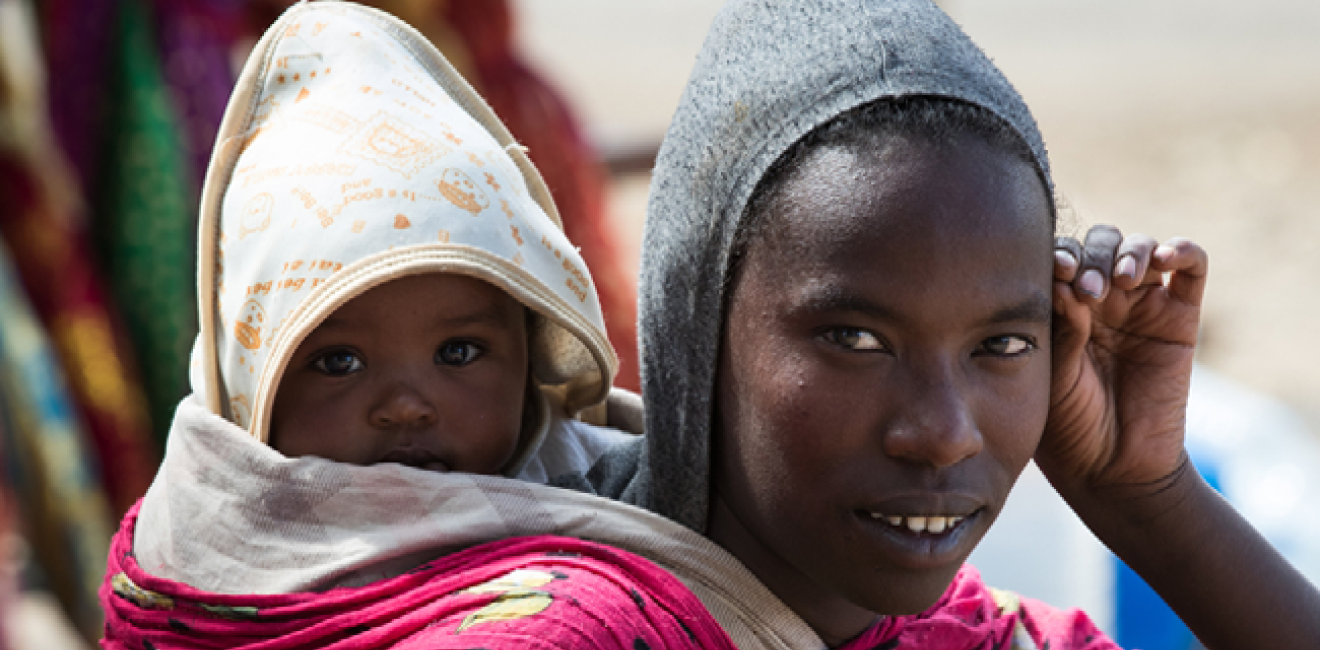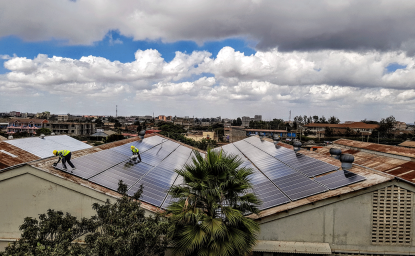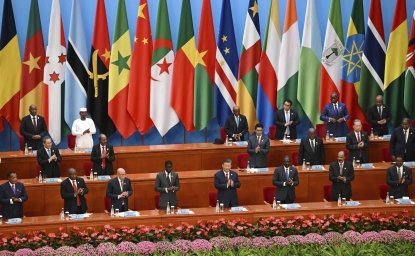
A blog of the Africa Program
The Ethiopia Demographic and Health Survey (EDHS) shows that among young women aged 20–24 years, 40.3 percent were married before the legal age of 18 while 14.1 percent were married before the age of 15. Of girls and women aged 15–49 years in Ethiopia, 65 percent have experienced FGM (Female Genital Mutilation) in various degrees.[i] These statistics rank Ethiopia as having the largest absolute number of FGM cases and the third highest rate of child marriage in eastern and southern Africa.[ii] The same demographic survey shows that a third of women aged 15–49 had experienced either physical or sexual violence.[iii]
Despite some encouraging trends, the challenges of eliminating harmful traditional practices (HTPs) persist in Ethiopia. To curb these practices, in 2015, the Ethiopian government pledged to end child marriage and FGM by 2025.[iv] However, social, religious, and cultural drivers significantly complicate the fight against HTPs. Social norms that stigmatize girls and their families over girls' premarital sexual activity is the leading cause of child marriage, while gender norms that seek to control female sexuality embedded in religious beliefs and cultural practices are causes for the perennial practice of FGM.
Alongside and in contrast to HTPs, every community has its own set of positive traditional practices that benefit members of the community. Of these, deep-rooted and home-grown institutions operating under the social norms of the community are often cited. In Africa, all community or ethnic groups have their own traditional and customary institutions that are compatible with the society's way of living. However, when states design institutional setups and construct policies in order to fight HTPs, traditional justice institutions are often ignored or at least sidelined in the process.
In all regions of Ethiopia where HTPs exist, there are traditional justice institutions formed to resolve problems that might be faced by the society. For instance Gereb (literally meaning river or stream) is a traditional justice institution established to prevent, manage, and resolve conflicts in northeast Ethiopia which operates based on norms passed down from generation to generation. In 1996, in consultation with the communities under its purview, the Gereb came out with codified rules, including rules that outlaw harmful traditional practices.
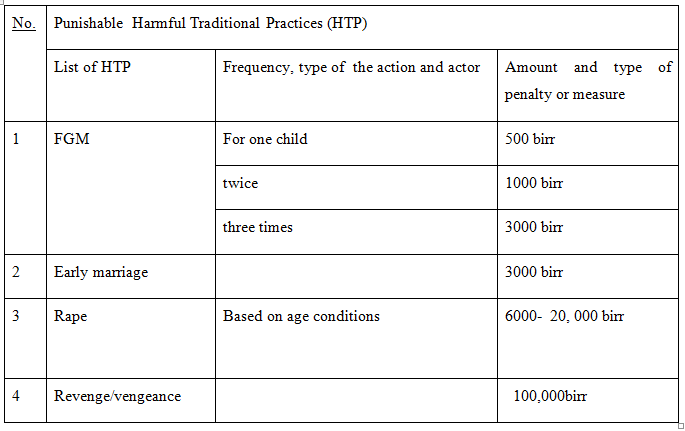
Source: Four examples of HTPs and penalty incorporated in the Gereb rules (sirit), in northeast Ethiopia, Tigray, Alamata District
Two mechanisms of enforcement are employed by the Abo Gerebs (leaders of the Gereb) in northeast Ethiopia's Alamata District (Tigray). First, as the Abo Gereb are viewed as key catalysts for changes in individual attitudes and potentially in social norms accepted at the community level, the Abo Gerebs hold biweekly awareness-creation programs at religious centers (churches and mosques). As influential role models, they persuade people to adopt new attitudes and perceptions towards HTPs. Second, as a last resort, when rule violations occur or are reported, formal punishment will follow.
Data from the Alamata District suggests that the practice of FGM is decreasing, early marriage (marriage below at least 15 years) is substantially lower these days, and rape cases are also reducing. A culture of vengeance is being subdued as well, coordinated with the traditional reconciliation system over time. In an interview held in July 2020 with Alamata community members, participants acknowledged that there has been a reduction of HTPs in the district.
On a regional basis, in the Tigray regional state, data compiled from 1991 through 2016 shows a steep reduction of FGM cases to the lowest number in Ethiopia. The percentage of adolescent girls aged 15 to 19 years who have undergone FGM in Tigray declined from 42 percent to 19 percent while child marriage declined from 80 percent to 40 percent, the most progressive result in Ethiopia.[v]
The Abo Gerebs acknowledged that defacto recognition by the local government and material support had been helpful in carrying out their activities. Local officials claim that communities comply more readily with the norms and rules of the Gerebs than with formal institutional setups and said that Gereb traditional justice institutions are playing a successful role in eliminating HTPs in the locality. In fact, these positive results should not be read to suggest economic development has no role or that governmental or nongovernmental organizations are irrelevant. Realistically, eliminating HTPs needs coordination between traditional, governmental, and non-governmental institutions. However, the question remains: shouldn't we include traditional justice institutions as actors in the process of eliminating HTPs? As the Africa Union mantra underscores "African solutions for African problems,'' African home-grown institutions should take on the challenge of fighting HTPs.
[i] National Costed Roadmap to End Child Marriage and FGM/C 2020–2024 Federal Democratic Republic of Ethiopia, Ministry of Women, Children and Youth August 2019, https://www.unicef.org/ethiopia/media/1781/file/National%20Roadmap%20to%20End%20Child%20Marriage%20and%20FGM.pdf
[ii] UNICEF, https://data.unicef.org/resources/a-profile-of-female-genital-mutilation-in-ethiopia/
[iii]Addressing violence against women and girls in Ethiopia, https://www.unodc.org/easternafrica/en/addressing-violence-against-women-and-girls-in ethiopia.html
[iv] Ethiopia Vows to Eliminate Child Marriage, FGM by 2025, https://reliefweb.int/report/ethiopia/ethiopia-vows-eliminate-child-marriage-fgm-2025
[v] Ending Child Marriage: A profile of progress in Ethiopia https://data.unicef.org/resources/child-marriage-in-ethiopia/
Awet Halefom Kahsay is a Ph.D. Candidate in Peace and Security Studies, Institute for Peace and Security Studies, Addis Ababa University, Ethiopia. He is a Southern Voices Network for Peacebuilding (SVNP) Scholar and an Africa Program Scholar during Spring 2022.
Photo source: Ethiopian young woman with baby on the back on Addis Ababa Street by Andrzej Kubik/Shutterstock.
Author
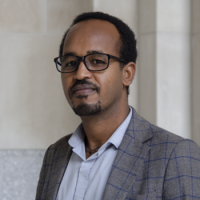
Ph.D. Candidate in Peace and Security Studies, Institute for Peace and Security Studies, Addis Ababa University, Ethiopia

Africa Program
The Africa Program works to address the most critical issues facing Africa and US-Africa relations, build mutually beneficial US-Africa relations, and enhance knowledge and understanding about Africa in the United States. The Program achieves its mission through in-depth research and analyses, public discussion, working groups, and briefings that bring together policymakers, practitioners, and subject matter experts to analyze and offer practical options for tackling key challenges in Africa and in US-Africa relations. Read more

